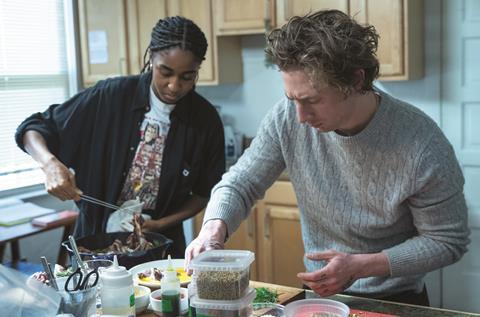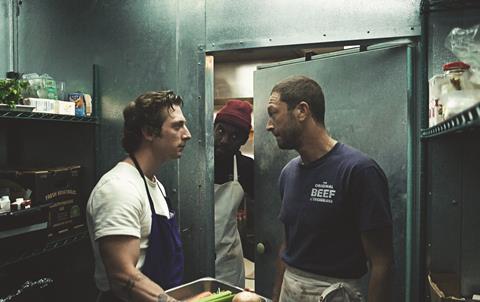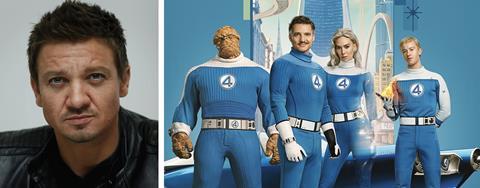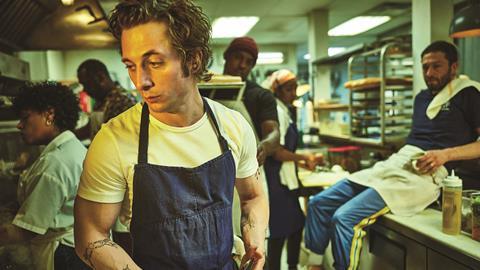A sweary Chicago TV series about a dysfunctional family restaurant has become a cult hit. As the fourth series hits our screens, Martin Saunders says it has a lot to teach Christians about loving one another well
Families are complicated. For some of us, the word itself can feel difficult and even painful; for others it describes our entire world. A family can be a ‘traditional’ unit of parents and children; it can be a wide extended web of relationships and connections. It can be two people who’ve made promises to each other, or even a virtual group, held together by common threads across the planet. It can be the lineage you were born into or the tribe that you joined. What links all these definitions together is a commitment to each other; an agreement – to try, at least – to love one another.
The value of family lies at the very heart of the Christian faith; we are adopted into God’s eternal family and get to be part of its flawed earthy expression, the Church. In an era of individualism, it has often been one of our most attractive features: the invitation to be part of a global community, marked by love. Yet as our culture shifts, the importance and urgency of family has been elevated in a diverse range of spaces way beyond the Church, just as the Church itself has become so marked by division. So, could the recurring narratives emerging in recent media have something prophetic to say back to the Church…about rediscovering its family values?
Bearing with
One of the best cultural illustrations of the power of family might also be one of the least family friendly. Disney+ TV show The Bear has such a ridiculous ratio of rude-to-clean words in its fast-paced scripts that it might reasonably be retitled The Swear. Yet if you’re able to grin and er, bear with the litany of f-words that seem to punctuate every character’s speech, you might discover your next favourite programme.
Let’s deal with this before we start: swearing isn’t cool or clever, and Paul directly urges us not to do it in Colossians 3:8. But this is a show about life in a profanity-soaked subculture, and as such it fairly represents how such characters would speak to each other; unless we find that sweary TV provokes us to imitate, I don’t believe it should necessarily bar our engagement.
Four seasons in, after the latest run of ten episodes were released at the end of June, The Bear is the story of a Chicago sandwich joint slowly transformed into a Michelin star-chasing restaurant. Or rather, it’s barely about that at all. Although the set-up provides an interesting context, and the beautiful culinary concoctions create some mouth-watering visuals, like all good stories this is really about its cast of characters; a wide sprawling family of people connected through blood, friendship, business…and in some cases, reasons that remain entirely unclear.
At the heart of this matrix is Carmy (Jeremy Allen White), a genius chef who has returned from working in the world’s best kitchen to take up his late brother’s dream of transforming their popular local joint into the best place to eat in the city. To describe Carmy as complex is a little like saying soufflé is tricky to bake, and the vast network of people around him both increase his challenges and provide a possible route through them.
Family is about connecting to something bigger than yourself
There’s Cousin Richie (Ebon Moss-Bachrach) – who is not really his cousin, of course – a brash porcupine of a man with a heart of gold who still mourns his divorce and the separation it brings from the daughter he loves. Chef Sydney (breakout star Ayo Edebiri) is Carmy’s protégée, the outsider welcomed into the chaos who frequently questions whether she can stand it any longer. Tina (Liza Colón-Zayas) leads the line of long-term employees who’ve graduated from staffing a sandwich spot to a high-end eatery (the ‘Bear’ of the title) and struggles not only to grow into her potential but to believe she’s worthy of doing so. And around this inner circle revolves a huge ensemble cast of characters – some of whom come and go in eye-catching cameos (Jamie Lee Curtis, Will Poulter, Olivia Colman and Brie Larson among them); all of whom have a link to this huge, complicated, beautiful mess of a family on a mission.
The show wears this theme clearly on the sleeves of its chef’s whites. Not only are the familial relationships continually explored in each episode, but the message throughout every twist and point of conflict is the same: family is everything. Though the characters often – even continually – fight, the arc always bends towards reconciliation and compromise, because the guiding ideal of unity around this central value burns so strongly. Even when Carmy and Richie can’t stand the sight of one another, they are profoundly connected by love, history and shared goals. Everyone wants to make this restaurant work, not just for its own sake, but for the sake of each other.

Family meals
I stood at a school sports day a few weeks ago and found myself chatting to another parent. She and her husband had recently left a local church, and while part of the reason for their departure involved theological differences with the leadership, the real reason they decided not to stay was much more troubling. “We hadn’t been for six months,” she told me. “And no one seemed to even notice we were gone.” She paused before adding: “We weren’t missed.” I don’t know about you, but I find that heartbreaking.
The picture of the early Church, described in Acts and implied throughout the epistles, is one of a bustling, fast-growing, all-in family. The believers live in close proximity and hold everything in common (Acts 2:44; 4:32). They meet together every single day, and as well as serving others they eat together, enjoying the sort of ‘family meal’ that’s also common among workers in the hospitality industry who lovingly cater for each other before or after a gruelling shift. They don’t allow anyone to be left out or left behind, ensuring that no one in need remains so. It is about as utopian as the Bible gets outside of its first and last few chapters. This is a glimpse of how things are meant to be: God’s family, centred around him, expressing their love by serving each other. When I watch The Bear, I’m not sure that the image created is all that different, even if the characters’ central ‘god’ is the journey towards financial stability and fantastic restaurant reviews.
This summer marks the fourth iteration of Satellites, the summer festival I help lead. Since the beginning, one of the key values that we’ve sought to teach and live out is ‘Family’; really our term for Church. We use the two words interchangeably because we want to give young people a sense of the glorious, global, history-spanning scale of the movement they are joining, but also because one offers a great picture of how the other is meant to be. In some ways, the average local church can often live up to that picture. Sometimes, as with that sad, forgotten sports day parent, it falls agonisingly short.

Family values
Occasionally, a big idea seems to become unusually prominent across culture. This often defies explanation, such as with the famous ‘twin movies’ phenomenon that has repeatedly seen two similarly themed films emerge at the same time (Armageddon and Deep Impact, or A Bug’s Life and Antz – all released in 1998 – are good examples). At other times, however, there are good reasons behind such creative convergence. At present, The Bear is far from the only media source to be espousing the value and centrality of family. Let me give you a couple of other examples.
On New Year’s Day 2023, Avengers and The Hurt Locker star Jeremy Renner was involved in a near-fatal accident on his Nevada property, when he was crushed by a huge piece of snow-clearing machinery. That incident, and the long and painful recovery that followed, are the subject of his memoir My Next Breath (Simon & Schuster), which was released in April. Although Renner goes into great detail describing his injuries and their impact (including one quite challenging passage on his experience of an ‘afterlife’), this isn’t the real subject of his book. Instead, the actor focuses on how his deep love of his extended family – who unwittingly slept on during the accident as he worked early to clear a path for them – got him through the torturous ordeal, and how the incident enabled him to realise that they were the only important thing in his life. His career achievements, houses, cars and riches were suddenly rendered meaningless. In a moment of clarity, he realised his real wealth and his true life’s work were both found in his network of blood ties and close friendships. The words, or something close to them, are found on almost every page: family is everything.
Until we get to join the eternal family meal, we’re left to create a prophetic replica here on earth
Renner may be taking a break from participating in the Marvel Cinematic Universe (MCU), but the never-ending comic-book production line continues apace. This month sees the release of Fantastic Four: First Steps, the long-awaited MCU debut of Marvel’s so-called ‘first family’. First, because they’re considered the foundational team that founded the Marvel Comic megalith; Family because they’re yet another collection of people united by both blood and choice. The titular characters are a husband and wife (and subsequently, their baby), the wife’s younger brother and the husband’s best friend. Judging by the trailer, it looks like another example of culture’s current obsession. “Family is about connecting to something bigger than yourself,” explains Vanessa Kirby’s Sue Storm. “Their greatest strength”, reads the caption, “is each other”. Another recent entry in the never-ending MCU, Thunderbolts had a very similar theme.
This isn’t the end of the list by a long way; this thread can be seen in a whole range of media, from TV streaming hits like Ted Lasso and Slow Horses, to movies as diverse as Oscar winner A Real Pain, and the fast-approaching Freakier Friday. Every one emphasises not only the value of family, but the ultimately unshakeable nature of the bonds within it. Families fight and forgive; laugh and cry together; ultimately put one another first. As I wrote back in the May edition of this column, the longest-running study of happiness in the world revealed that these kinds of relationships are the key to a happy and fulfilling life. Could our culture finally be waking up to the idea that “life does not consist in an abundance of possessions” (Luke 12:15)?

Soul bearing
The Bear’s ode to family is so powerful because it draws two versions of the concept seamlessly together. First, the family unit – parents and elders who care selflessly; wives and husbands who try to love and put each other first and children who recognise their responsibility – is affirmed. Yet into this mix of blood and marriage, others are drawn and welcomed. A wider family is created where everyone knows they are invited to belong and find their place; where anyone who didn’t show up would immediately be missed. In the standout episode of Season four, a wedding-centric screenwriting masterpiece entitled ‘Bears’, the climactic scene has almost every main cast member hiding under the same enormous table, talking about their fears to enable Richie’s daughter to face up to her own. Though we see their individual personalities, we also see them merge into one. They live for each other. They are each other.
This is what Church can be like, at its best. That isn’t just the utopian domain of the first iteration: freshly Spirit-filled, with muscle memory of taking Jesus’ literal human hand. There are churches worldwide where groups of people are drawn together, sometimes by blood and marriage, sometimes by invitation, and often in ways no one can quite remember. They love each other deeply and bear(!) with one another’s burdens. They say sorry and use their different gifts to work together towards a greater, glorious goal. Everyone matters and everyone is missed when they’re absent.
Families fight and forgive; laugh and cry together; ultimately put one another first
Local church can be like this. And sometimes it’s not. People often join churches because of great preaching, excellent worship or youth work. They leave churches when they no longer feel like family. When brokenness and shame are awkwardly pushed into a corner for the sake of keeping up appearances. When certain parts of the body get cut off, sidelined and forgotten. These are the things that truly cause family breakdown.
Family isn’t everything, of course, unless by that we’re talking about adoption into God’s eternal family, via Jesus, our brother (Hebrews 2:11-12). Yet until we get to join the eternal family meal, we’re left to create a kind of prophetic replica here on earth. Our efforts to do that are, let’s be honest, hit and miss at times. It might seem a little unconventional, but I believe that God can speak to us prophetically about what true family could look like, even through a sweary TV show. Much more so via an entire cultural revival.
“There is probably one really true thing about restaurants,” Carmy tells a colleague at one point in the most recent series of The Bear. “You are never alone.” May that be even more true of our churches; the God-ordained families in which we can find meaning, love and life in all its fullness.
The Bear seasons 1-4 are available to stream now on Disney+






































No comments yet